Diabetes is a condition characterized by abnormal metabolism and insulin hormone dysfunction. Diet plays a crucial role in managing the disease, controlling blood sugar levels, and preventing complications such as diabetic retinopathy, diabetic nephropathy, and cardiovascular disease. Particularly important are food choices, portion sizes, meal timing, and following a diabetes diet menu plan.
Why Diabetes Patients Need to Control Food Portions
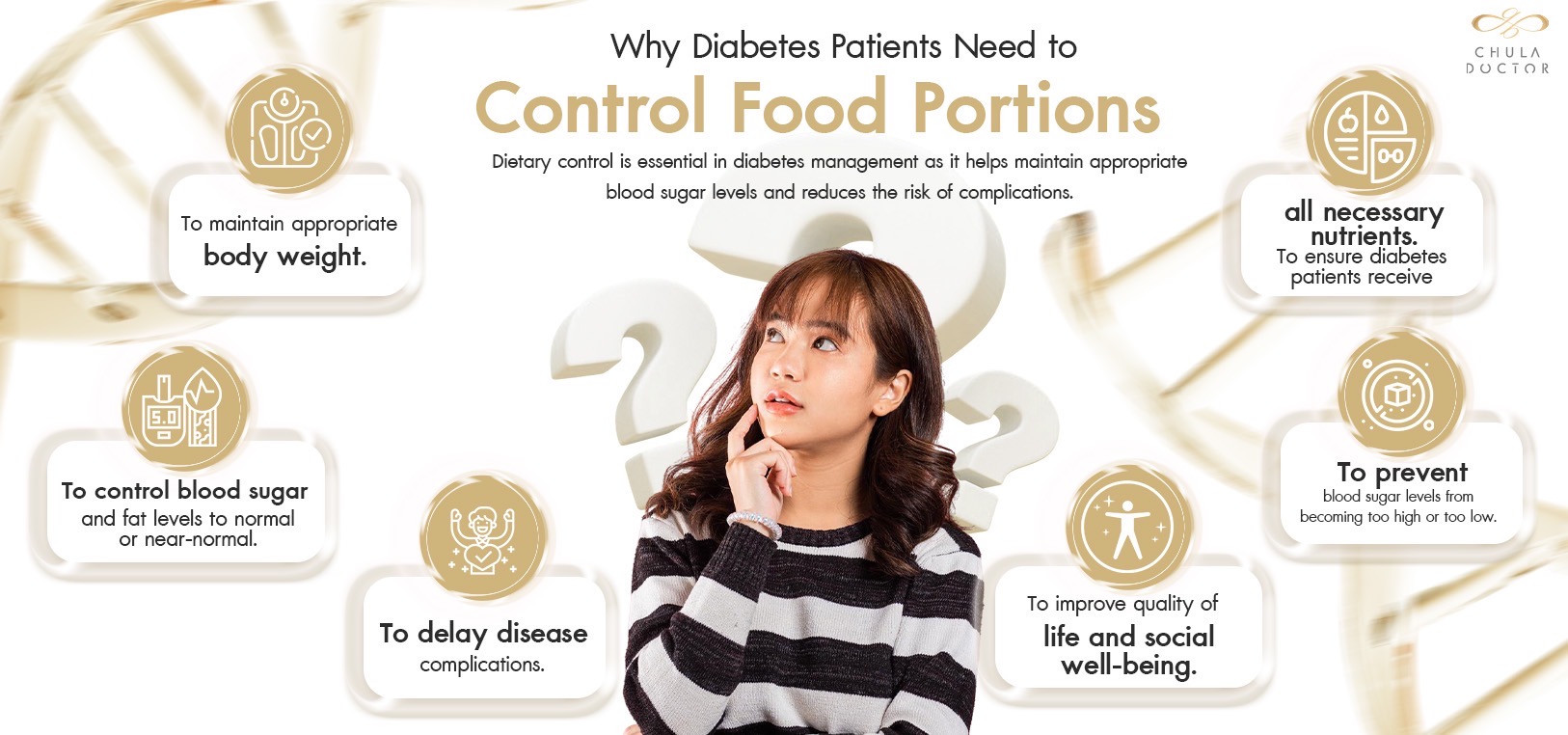
Dietary control is essential in diabetes management as it helps maintain appropriate blood sugar levels and reduces the risk of complications.
- To control blood sugar and fat levels to normal or near-normal.
- To maintain appropriate body weight.
- To delay disease complications.
- To ensure diabetes patients receive all necessary nutrients.
- To prevent blood sugar levels from becoming too high or too low.
- To improve quality of life and social well-being.
Blood Sugar Control Guidelines for Adult Diabetes Patients
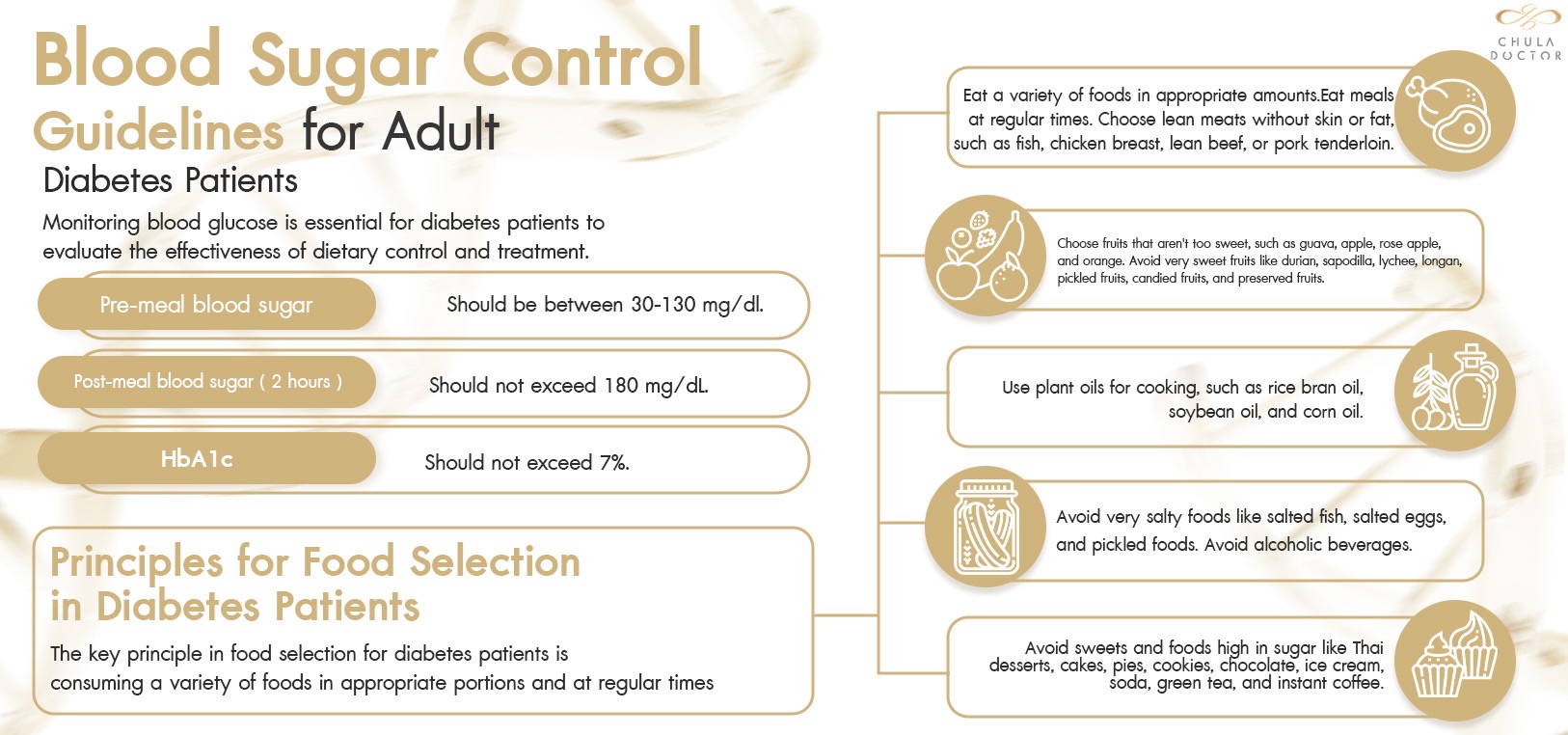
Monitoring blood glucose is essential for diabetes patients to evaluate the effectiveness of dietary control and treatment.
- Pre-meal blood sugar: Should be between 90-130 mg/dL.
- Post-meal blood sugar (2 hours): Should not exceed 180 mg/dL.
- HbA1c: Should not exceed 7%.
Principles for Food Selection in Diabetes Patients
The key principle in food selection for diabetes patients is consuming a variety of foods in appropriate portions and at regular times.
- Eat a variety of foods in appropriate amounts.
- Eat meals at regular times.
- Choose lean meats without skin or fat, such as fish, chicken breast, lean beef, or pork tenderloin.
- Choose fruits that aren’t too sweet, such as guava, apple, rose apple, and orange.
- Avoid very sweet fruits like durian, sapodilla, lychee, longan, pickled fruits, candied fruits, and preserved fruits.
- Use plant oils for cooking, such as rice bran oil, soybean oil, and corn oil.
- Avoid very salty foods like salted fish, salted eggs, and pickled foods.
- Avoid alcoholic beverages.
- Avoid sweets and foods high in sugar like Thai desserts, cakes, pies, cookies, chocolate, ice cream, soda, green tea, and instant coffee.
Foods Diabetes Patients Should Avoid
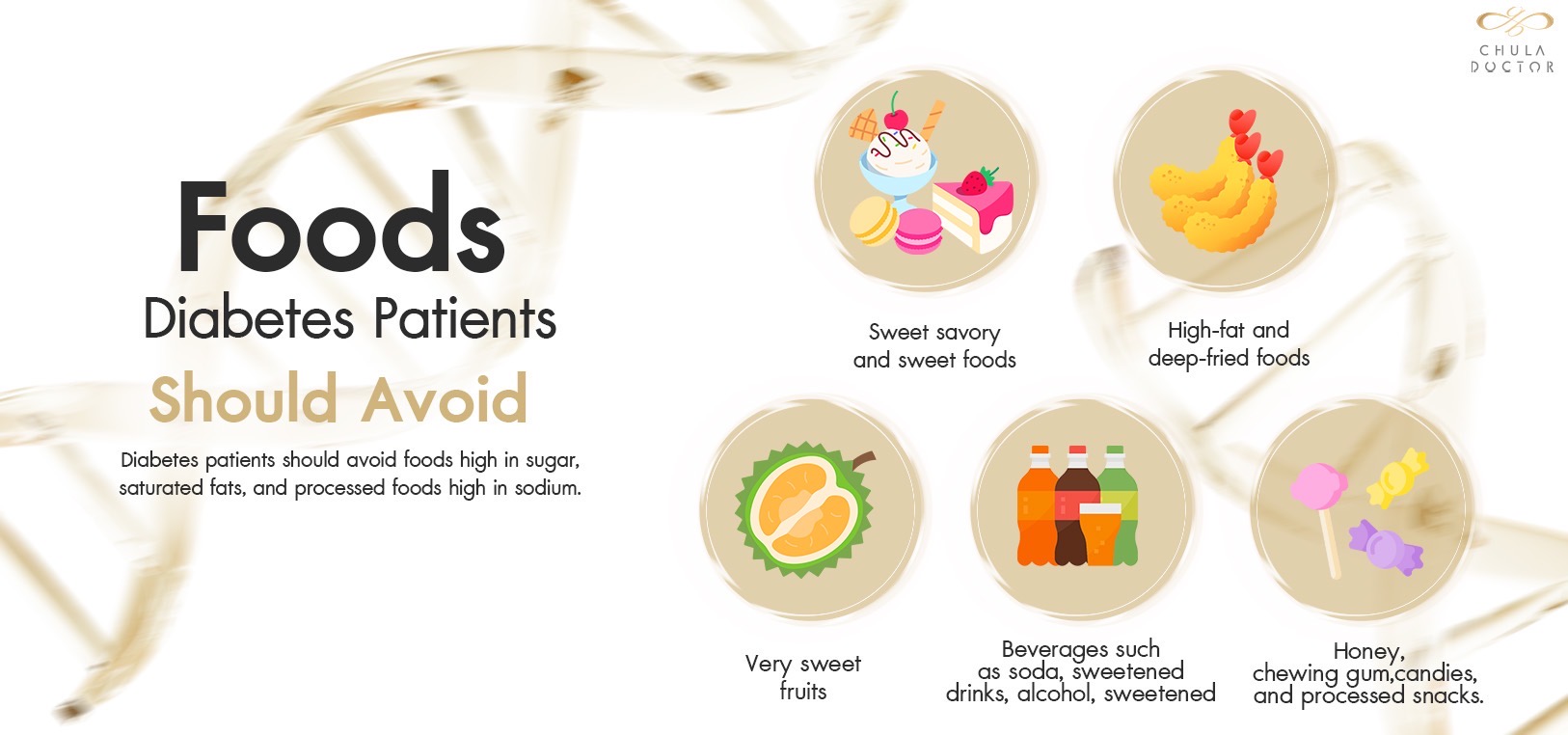
Diabetes patients should avoid foods high in sugar, saturated fats, and processed foods high in sodium.
- Sweet savory and sweet foods such as crispy noodles, massaman curry, sweet pork, rice noodles, chili paste, and various desserts.
- High-fat and deep-fried foods such as pork leg, fried chicken, duck skin, chicken skin, animal organs, fried oysters, fried bananas, Chinese donuts, and pork rinds.
- Very sweet fruits such as sapodilla, longan, jackfruit, sugarcane, dried fruits, candied fruits, preserved fruits, and canned fruits.
- Beverages such as soda, sweetened drinks, alcohol, sweetened condensed milk, flavored milk, Ovaltine, Milo, and cocoa.
- Honey, chewing gum, candies, and processed snacks.
Foods Diabetes Patients Should Eliminate
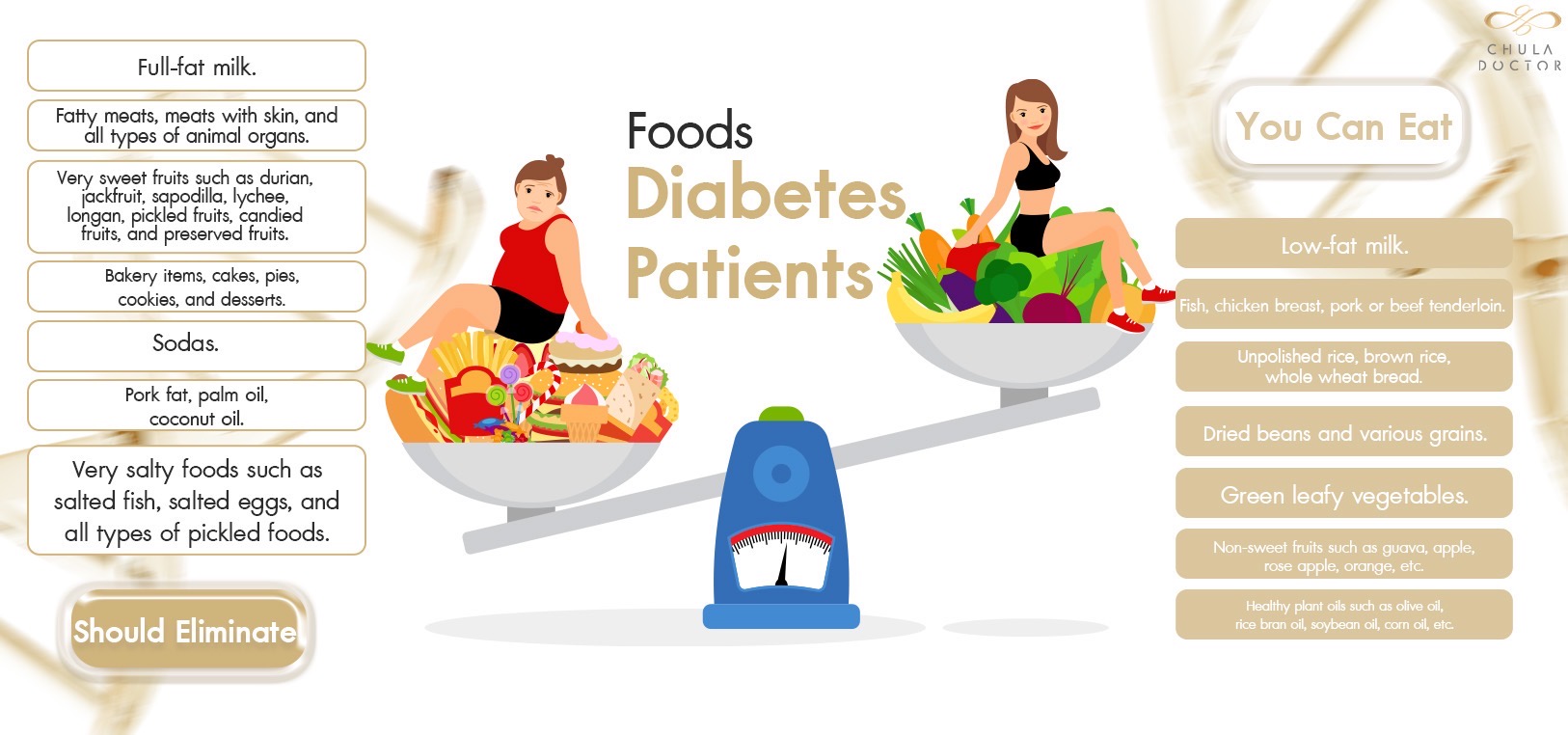
Certain foods should be eliminated by diabetes patients to control blood sugar and fat levels.
- Full-fat milk.
- Fatty meats, meats with skin, and all types of animal organs.
- Bakery items, cakes, pies, cookies, and desserts.
- Sodas.
- Very sweet fruits such as durian, jackfruit, sapodilla, lychee, longan, pickled fruits, candied fruits, and preserved fruits.
- Pork fat, palm oil, coconut oil.
- Very salty foods such as salted fish, salted eggs, and all types of pickled foods.
Diabetes Foods You Can Eat
Diabetes foods you can eat include foods with low glycemic index, high fiber, and healthy fats that help maintain stable blood sugar levels.
- Low-fat milk.
- Fish, chicken breast, pork or beef tenderloin.
- Unpolished rice, brown rice, whole wheat bread .
- Dried beans and various grains.
- Green leafy vegetables.
- Non-sweet fruits such as guava, apple, rose apple, orange, etc.
- Healthy plant oils such as olive oil, rice bran oil, soybean oil, corn oil, etc.
7-Day Diabetes Diet Menu Plan
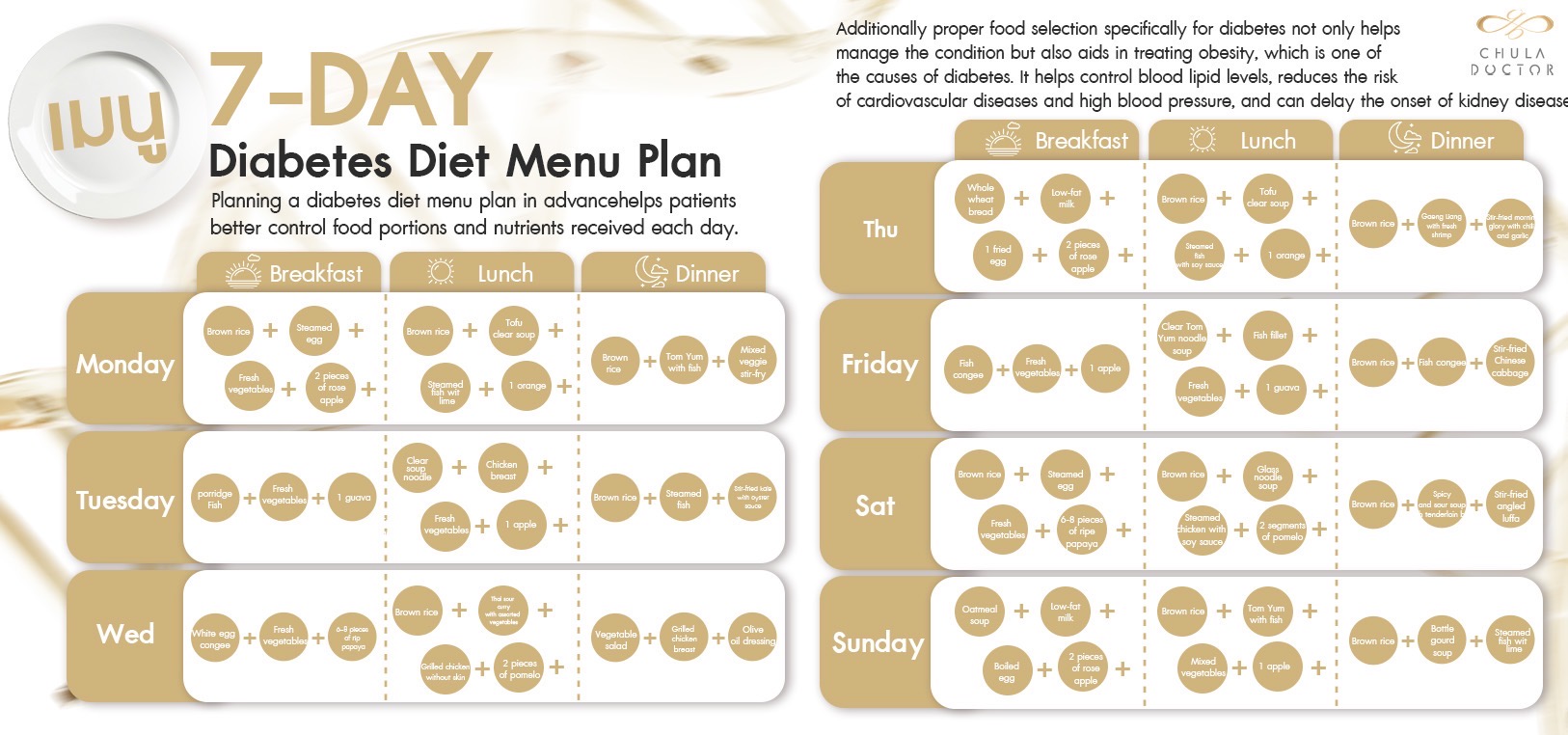
Planning a diabetes diet menu plan in advance helps patients better control food portions and nutrients received each day.
Monday
- Breakfast: Brown rice + steamed egg + fresh vegetables + 1 rose apple.
- Lunch: Brown rice + tofu soup + steamed fish with lime + 1 orange.
- Dinner: Unpolished rice + tom yum fish soup + stir-fried mixed vegetables.
Tuesday
- Breakfast: Fish porridge + fresh vegetables + 1 guava.
- Lunch: Clear noodle soup + chicken breast + fresh vegetables + 1 apple.
- Dinner: Brown rice + steamed fish + stir-fried kale with oyster sauce.
Wednesday
- Breakfast: Rice porridge with egg whites + fresh vegetables + 6-8 pieces of ripe papaya.
- Lunch: Brown rice + sour curry with mixed vegetables + grilled skinless chicken + 2 pomelo segments.
- Dinner: Vegetable salad + grilled chicken breast + olive oil dressing.
Thursday
- Breakfast: Whole wheat bread + low-fat milk + 1 fried egg + 2 rose apples.
- Lunch: Brown rice + clear soup with tofu and minced pork + steamed fish with soy sauce + 1 orange.
- Dinner: Brown rice + vegetable soup with fresh shrimp + stir-fried morning glory.
Friday
- Breakfast: Fish porridge + fresh vegetables + 1 apple.
- Lunch: Clear tom yum noodle soup + fish meat + fresh vegetables + 1 guava.
- Dinner: Brown rice + tom yum fish soup + stir-fried Chinese cabbage.
Saturday
- Breakfast: Brown rice + steamed egg + fresh vegetables + 6-8 pieces of ripe papaya
- Lunch: Brown rice + glass noodle soup + steamed chicken with soy sauce + 2 pomelo segments
- Dinner: Unpolished rice + spicy beef tenderloin soup + stir-fried angled luffa
Sunday
- Breakfast: Oatmeal soup + low-fat milk + boiled egg + 2 rose apples.
- Lunch: Brown rice + tom yum fish soup + stir-fried mixed vegetables + 1 apple.
- Dinner: Brown rice + winter melon soup + steamed fish with lime.
Additionally, proper food selection specifically for diabetes not only helps manage the condition but also aids in treating obesity, which is one of the causes of diabetes. It helps control blood lipid levels, reduces the risk of cardiovascular diseases and high blood pressure, and can delay the onset of kidney disease as well.
Conclusion
Dietary control is central to self-care for diabetes patients. Proper food selection not only helps control blood sugar levels but also reduces the risk of various complications.
Diabetes patients should consult with doctors and nutritionists to plan a diabetes diet menu plan suitable for their individual needs, as nutritional requirements may vary according to physical condition, disease severity, and treatment received.
Proper diet combined with regular exercise and medication as prescribed by doctors will help diabetes patients live a quality life, free from complications, and maintain good health in the long term.
For those looking to lose weight properly for sustainable good health, Chula Doctor Clinic has a team of expert physicians ready to provide advice and comprehensive treatment planning. With specialized expertise in properly caring for patients with excess weight to reduce the risk of developing diabetes.
Consult with specialist doctors at Chula Doctor Clinic for health problems, because good health begins with proper and appropriate care.






